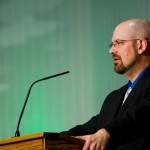 by Dr. James White
by Dr. James White
“Simon Peter said to them, “Make Mary leave us, for females don’t deserve life.” Jesus said, “Look, I will guide her to make her male, so that she too may become a living spirit resembling you males. For every female who makes herself male will enter the domain of Heaven.”1
A glance at the ancient text reproduced above immediately tells the reader that the author knew little, if anything, of biblical teaching concerning the roles of men and women, and of the fact that both men and women were created in the image of God. Such false teaching comes plainly from Gnostic sources that vilified the body and exalted the spirit, and in the process often denigrated the feminine and exalted the masculine. The early church struggled long and hard against Gnosticism, which constantly threatened her. As early as Paul’s epistle to the Colossians, we find a strong warning against “proto–Gnosticism,” telling us that Christ cannot be placed in any position other than that of Creator (Col. 1:15–18; 2:8–9).
Anyone who thinks Gnosticism no longer has proponents should be advised that the truth is just the opposite. In fact, if the self–aggrandizing press releases of the Jesus Seminar are to be believed, the consensus of scholarship now believes that documents thoroughly influenced by Gnosticism, such as the Gospel of Thomas, from which the above citation is taken, are far more reflective of the actual teachings of Jesus Christ than the “canonical Gospels” familiar to most Christians — Matthew, Mark, Luke, and John.
The Jesus Seminar is a small group of extremely liberal scholars.2 Yet they seem to have a lock on the major media outlets so that their pronouncements are taken as the final word by major magazines, newspapers, and public broadcasting programs. As a result, headlines proclaiming that scholars have “discovered” that Jesus never said He’d return (so He won’t), and the like, are common fare. What is worse, this kind of material finds its way into the college classroom as the “assured results of critical scholarship,” and young Christians are faced with the specter of this imposing group of Bible scholars condemning their faith in a risen Savior as mere myth.
The leaders of the Jesus Seminar confidently proclaim themselves to be the standard bearers of the scholarly consensus. While they are, in reality, far away from the vast majority of biblical scholars, they vigorously deny their own marginality by proclaiming that everyone else is marginal.
Continue reading

 In the political spectrum, there are folk on the left and the right (and in the middle of course). Then there is the LUNATIC fringe – SO FAR to the left or SO FAR to the right that they are just waaaay ouuuutttt theerrrre in wacko land.
In the political spectrum, there are folk on the left and the right (and in the middle of course). Then there is the LUNATIC fringe – SO FAR to the left or SO FAR to the right that they are just waaaay ouuuutttt theerrrre in wacko land. Dr. R. C. Sproul commented, “In my opinion, from an academic since, I believe the Jesus Seminar is a lunatic fringe of scholarship.”
Dr. R. C. Sproul commented, “In my opinion, from an academic since, I believe the Jesus Seminar is a lunatic fringe of scholarship.”